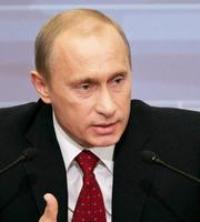No discussion of extending presidential term to be held until late 2008 in Russia

Only after President Vladimir Putin leaves his office the Parliament could look into extending the presidential term, Russian news agencies reported.
The statement from Sergei Mironov, speaker of the Federation Council, the upper chamber of parliament, appeared aimed at dampening persistent speculation that Putin aims to stay in office past the end of his second term in April. The constitution allows only two consecutive four-year terms.
Putin has repeatedly said he does not intend to go beyond a second term. But his statement in an interview released this week that he believed the presidential term should be longer than four years raised speculation that he was pushing for such an extension before the presidential election scheduled for March.
Mironov said such an extension could be considered by parliament "no earlier than the second half of 2008," the Interfax and ITAR-Tass news agencies reported.
The leader of the pro-Putin United Russia party, which holds an overwhelming majority in the lower house of parliament, said the party has no intention of seeking to change the constitution to allow a third term. The party "will stand guard on the current Constitution," Interfax quoted Boris Gryzlov as saying.
Mironov in March called for the presidential term to be extended to allow Putin to stay in office. That proposal was quickly shot down by the Kremlin.
In his interview with selected foreign media ahead of the Group of Eight summit, Putin said "Four years is a fairly short time ... It seems to me that in today's Russia five, six or seven years would be acceptable, but the number of terms still should be limited."
Putin has not publicly stated who he would prefer to see succeed him - an endorsement that would carry immense influence and likely make his preferred candidate certain to become president.
Some leaders in post-Soviet states have called referendums under which term extensions apply to them retroactively, but those moves have been widely criticized abroad as naked power-grabs. It is not clear if Putin, already facing intensifying criticism from the West for rolling back on democracy, would be willing to risk such a move.
However, he could portray himself as leaving office after too short a period and use that to bolster support for his preferred successor.
Putin has given little indication of what he might do after leaving the presidency, but with his vigorous health and comparatively young age - he will be 55 at the election - he is likely to want to occupy a position of visibility and influence.
"I am far from pension age and it would be absurd just to sit at home doing nothing," he said in the interview.
There is a lot of speculation on Putin's future if he does step down. Some predict his successor will name him prime minister. Others say he may take a leading role in one of Russia's powerful state-controlled businesses, in particular the nation's natural gas monopoly, Gazprom.
Subscribe to Pravda.Ru Telegram channel, Facebook, RSS!


